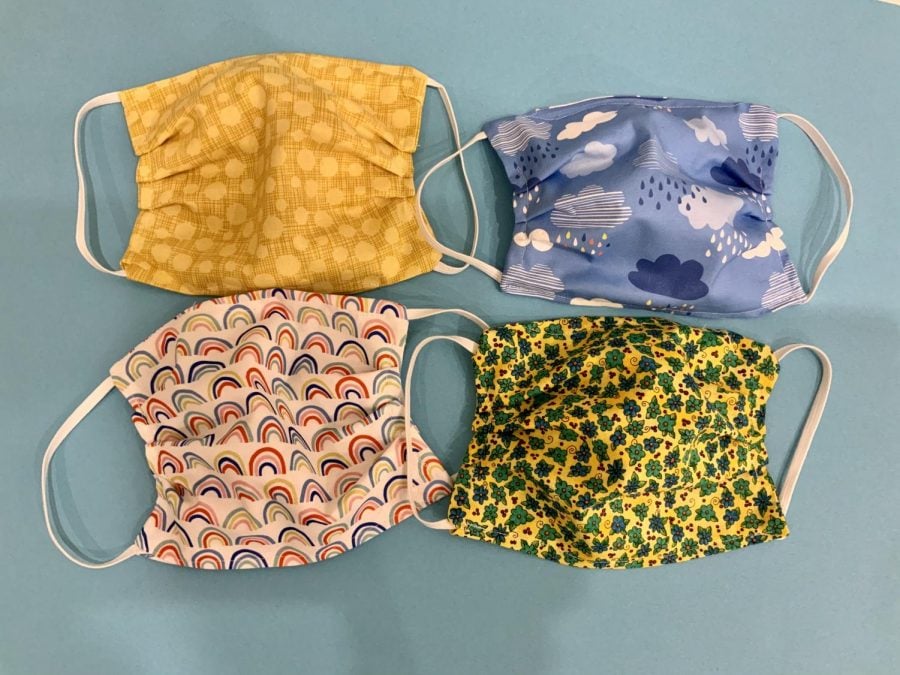Local businesses sew masks to address shortage
Sew on Central makes masks and donates them to a senior living community in Morton Grove. Community members can also drop off masks they make in the box outside its storefront.
March 30, 2020
After seeing reports about mask shortages during the COVID-19 outbreak, customers reached out to Evanston Stitchworks owner Amalia Malos on March 20 about an effort to make hand-sewn masks. She said her response was a “no brainer.”
Within a day, Malos connected with organizations that had already established efforts to advise sewers on how to make masks and developed a plan. Now, a week later, Malos has put together over 100 kits, which she said will yield hundreds of masks in total.
“There’s a crisis in medical supplies and availability,” Malos said. “There’s people who have access and those who don’t, and there’s something we can do about that.”
Evanston Stitchworks typically sells knitting supplies and offers sewing classes. But amid the COVID-19 pandemic, Malos and other Evanston businesses owners have used their resources to address the shortage of N95 masks.
The movement to make hand-sewn masks is not specific to Evanston. People are making masks in a variety of states due to reports of shortages of medical-grade masks. According to the Center for Disease Control, if medical-grade face masks are not available, healthcare personnel can use homemade masks to care for patients with COVID-19 “as a last resort.” Malos said the situation has devolved to the point where a last resort is all that is left.
Evanston Stitchworks has been giving out kits for people to sew masks at home. Kits are free and contain enough fabric and elastic to make 10 to 14 masks. Malos also raised over $2,500, which goes towards purchasing materials that go in the kits.
Those interested can pick up kits outside Evanston Stitchworks, or Malos can ship them to houses. Some community members donate the masks they make to local institutions, while others send masks to those in need across the country.
“This is a grassroots movement based on individuals’ dedication,” Malos said. “Because of social distancing, we can’t all sit around and do this together.”

Karen Graham, owner of Sew on Central, also jumped into action to address the need for masks. She makes masks and donates them to a senior living community in Morton Grove. Graham also left a box outside of her storefront for residents to drop off completed masks.
Graham said an experienced sewer takes about 10 minutes to make one mask. Between the masks she has sewn and the masks she has collected from community members, Graham said she has already over 100 ready to distribute.
“The community response has been amazing,” Graham said. “Everyone is trying.”
Rogie Sussman Faber, owner of Vogue Fabrics, said Evanston businesses making masks are facing a nation-wide material shortage. She said stores like Vogue are unable to keep up with the demand for supplies like elastic especially. Now, sewers are turning to alternatives such as fabric ties or twill tape in order to complete their masks.
Vogue wholesales fabric and elastic out of its warehouse and is a distributor for an elastic mill. Towards the beginning of the COVID-19 outbreak in the United States, Faber said small businesses and individual sewers ordered materials to make masks. Then, corporations contacted Vogue, like the Ford Motor Company and Atlantic Gasket, as they began mass producing masks. Faber said the large orders these companies placed “wiped out” the supply of Vogue and other local businesses.
Currently, Vogue has nothing left in stock, but Faber has ordered additional materials that should be delivered soon. She said the store is putting all other business on hold to focus on mask making efforts.
“At a time like this, it’s helpful for people to feel useful and like they’re participating in filling the need,” said Faber. “I just keep picturing Rosie the Riveter.”
Reyes Witt, owner of Assembly Creators Market, also started a mask-making effort. But she took a different approach.
Witt collaborated with health care professionals and craftspeople to design a mask that looks like a duck bill. This shape makes it easier for those wearing the mask to breathe. Tandem Thinking and Juniper Solutions Group, consulting firms in the Chicagoland area, worked pro bono to create the first model. Courtney Lyons, who teaches classes at Sew on Central, and Annie Coakley, executive director of Downtown Evanston, also donated their time. Witt said everyone worked “countless hours.”
Witt will pay makers and designers to sew the masks; 70 percent of each sale goes to whoever makes it. She said many of these individuals have seen a large decline in business since the pandemic began and hopes to support them by providing a small source of income.
Witt launched mask sales last week. Sewers will use the best materials available to make each mask as fabric and elastic is limited. Anyone can purchase the masks on Assembly Creator Market’s website.
“At the end of the day, we want to be a part of a solution,” Reyes said. “These masks are Band-Aids, but they’re safer than nothing.”
Email: [email protected]
Twitter: @zoermalin


